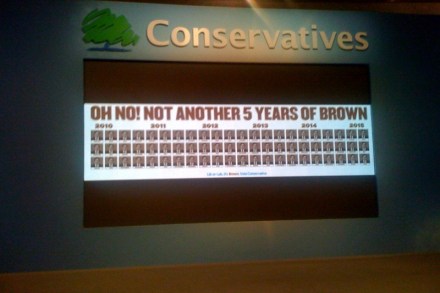The Tories’ final onslaught
“Where’s the popcorn?” I thought, as I joined a bunch of journos to watch the Tories’ final broadcast of the election campaign. It was a good nine minutes long, and might as well have been titled The Downfall of New Labour. The opening shots were of Blair and Brown in 97: “a new dawn,” and all that. But Blair’s image soon faded to black-and-white, and we were bombarded with a montage of headlines, quotes and images which highlighted the failures of the Labour years. 10p tax. Falling education standards. MRSA. The misdemeanours of Peter Mandelson. Defence spending. Purnell’s resignation. Gillian Duffy. Even Manish Sood’s comments today. Depending on your disposition,













